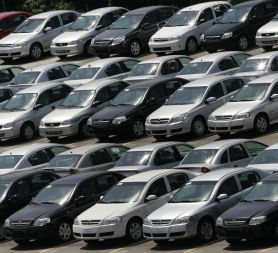Bad economy, good environment?
Updated on 23 April 2009
Channel 4 News online looks at five environmental indicators to find out if a poorer world is a greener one.

Amid gloomy economic news of rising unemployment and debt, does the global economic downturn have a major benefit - namely, is it good for the environment?
Five green shoots?
Car use in the US slumps
Cars are responsible for significant carbon dioxide, methane and nitrous oxide emissions - so it is seemingly good news that car use is on a downward spiral in the world's most motor-friendly nation, the United States.
Figures released this week by the US Transportation Department show that Americans drove fewer miles in February, for the 15th month in a row.
US highway travel was down 0.9 per cent in February from a year ago, falling 1.9bn miles to 215.8bn miles.
Air miles decline
Pound for pound air travel is, according to most scientists, one of the most harmful things you can do for the environment.
While still only making up a fraction of the world's overall carbon emissions, the fact that they are emitted at higher altitude attracts extra environmental concern.
Positive then perhaps that the International Air Transport Association (IATA) - due to a drop in both demand for freight and passenger travel - predicted a drop of up to 7 per cent in air travel this year.
'If there is a recession we would expect a reduction in emissions as we are producing less and consuming less.'Neil Adger, an environmental economist
Chinese cement production hits concrete wall
The world's most populous nation produces the most cement, which in turn helps China to produce the most carbon emissions.
China's cement exports fell almost 13 per cent year-on-year in 2008. A similar fall is expected domestically in 2009.
All at sea
Shipping, although traditionally thought of as environmentally friendly, had grown so fast that the pollution it created was at least 50 per cent higher than previously thought, with fears over sulphur as well as carbon emissions.
Port operators said this week that the shipping trade had hit "rock bottom".
Overall greenhouse gas figures
It's not all 'good' environmental news though. Researchers for the National Oceanic and Atmospheric Administration measured an additional 16.2bn tons of carbon dioxide and 12.2m tons of methane in the atmosphere at the end of December 2008.
The increases in carbon and methane during 2008 were slightly less than those measured in 2007, but fall well within the range of yearly fluctuations from natural changes.
It may be too early for these figures to truly assess the impact of the credit crunch, however.
Expert view
Neil Adger, an environmental economist at the University of East Anglia and the Tyndall Centre for Climate Change, said: "If there is a recession we would expect a reduction in emissions as we are producing less and consuming less.
"But for example, does a 3.5 per cent contraction in GDP mean a 3.5 per cent reduction in emissions?
"When the USSR collapsed, production fell by between 30 to 40 per cent, but the actual reduction in greenhouse gas emissions was far less.
"It's generally because a lot of the emissions are embedded in the methods used in producing food and transport, and those activities remain unchanged.
"Recession means less investment - so are high emissions technologies getting replaced? Or does the lack of money mean bad technology remains?
"Lord Stern produced a report suggesting that it would take £400bn globally in the stimulus money to make the fundamental shift towards a green economy, but as far as I can see in Britain there is very little in the most recent budget that you could term 'green'.
"Whereas somewhere like South Korea, where lots of stimulus money has been focussed on the housing stock and public transport, a high percentage of their investment money could be termed as 'green'.
"So overall, the recession certainly helps reduce emissions, but whether it causes a long-term change is another matter."


